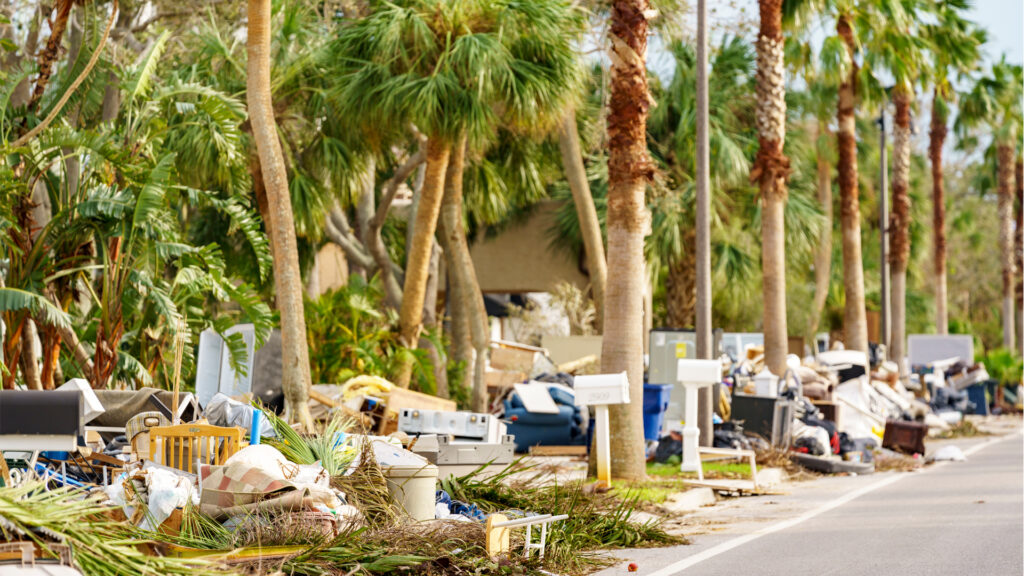By Zac Taylor, Delft University of Technology
Recently, my family and I reconnected with close friends over dinner at Gigi’s on Treasure Island, a local institution and perennial favorite. It was a poignant evening, marking the restaurant’s first night back in operation since Hurricane Helene inundated thousands of Gulf Coast homes and businesses with several feet of water. Just weeks later, Hurricane Milton’s strong winds added insult to injury.
While Gigi’s has reopened its doors, the scene on Pinellas County’s barrier islands remains grim, even two months after Helene. Lives have been lost. Homes have been gutted by the brute force of Helene’s storm surge. Hotels, restaurants and shops are hollowed out. Towering heaps of sand-blasted debris and waterlogged building materials still line streets.

But this isn’t just about the challenges of rebuilding after another storm. For Floridians and others, it’s about a strained home insurance system, with premiums skyrocketing and private insurers scaling back coverage or leaving communities entirely.
Florida has the highest property insurance costs in the nation, with premiums soaring 102% in a three-year span. This makes coastal living — and recovery after the next storm — more expensive or outright impossible for all but the wealthiest.
This reflects a broader crisis across the country: our over-reliance on insurance to make housing possible as climate change makes disasters more frequent and more severe.
For the past decade, I’ve researched Florida’s insurance breakdown, shaped by two core challenges. First, we lean too heavily on insurance to sustain real estate markets in disaster-prone areas. Without insurance, securing a mortgage is nearly impossible, destabilizing housing markets and putting ownership further and further out of reach for many. Insurance has become a keystone of our housing system, but it alone cannot hold the weight of climate change.
Second, insurers’ profit motives often clash with the broader societal need to protect communities in disaster-prone areas. As insurers limit their exposure in areas like Tampa, frontline communities increasingly find coverage scarce or unaffordable. This dynamic recalls the legacy of financial redlining, reinforcing inequities in disaster-prone regions.
At the same time, many insurers continue to underwrite fossil fuels, propping up an industry that harms frontline communities the most. We face a vicious feedback loop of increasing risk and declining protection. And many are already suffering.
These overarching facets of the home insurance crisis are rarely jointly addressed in policy discussions. That’s why I contributed to Shared Fates, a report offering solutions to the nationwide insurance crisis.
This crisis is collective, not just coastal. Politicians in D.C. and Tallahassee are pushing to take climate risk and skyrocketing insurance rates off the policy agenda. Still, the need to propose bold, innovative solutions is more critical than ever. Hurricane Helene underscored this reality, devastating communities from Florida to Asheville, North Carolina, once dubbed a “climate haven.”
Yet as climate threats spread, the impacts remain deeply unequal. Many communities face multiple climate risks, often intensified by socioeconomic vulnerabilities. For instance, 10% of Native American and Alaskan Native households face four or more unique climate risks, far above the national average.
Inequality also shows up in housing-market stress. Renters bear rising costs as landlords pass on insurance expenses. Affordable-housing developers halt projects or eschew weather-hardening retrofits due to limited incentives and lack of insurance coverage. These aspects are central to the home insurance crisis but often go unreported.
The answer isn’t to patch a broken system; it’s to reimagine it. Our report advocates for expanding affordable, publicly provided insurance access across diverse properties, from single-family to mobile homes, and a variety of residents, including renters. Key to this model are greater risk-sharing and swift post-disaster financing.

We must also lower risk exposure in frontline communities through retrofits, new building approaches and forward-looking spatial planning. Although evidence shows that these methods work, existing programs are far too limited in scale or are insufficiently integrated to meet today’s reality.
To bridge this gap, we propose establishing Housing Resilience Agencies, linking affordable insurance directly to risk-reduction efforts. The agencies would help individuals and communities make informed, sustainable decisions about disaster risk, guide decisions about where it’s unsafe to build, assist with relocation from high-risk zones, and support community-based risk mitigation. The more we invest in up-front prevention, the less we’ll depend on insurance to finance losses after the next disaster.
We can no longer afford to ignore our shared fate. A coordinated approach that integrates insurance with resilience and risk reduction is our best chance at building a sustainable, secure future.
Zac Taylor is an assistant professor of management in the built environment at Delft University of Technology in the Netherlands and academic lead at the Resilient Delta initiative. Taylor is also a fellow at the Climate and Community Institute and a 2007 recipient of a Barnes Scholarship, named after Andrew Barnes, retired chairman and CEO of the Tampa Bay Times.
This opinion piece was originally published by the Tampa Bay Times, which is a media partner of The Invading Sea. Banner photo: Damage caused by Hurricane Helene in Steinhatchee (U.S. Army Photo by Brigida Sanchez, via Defense Visual Information Distribution Service).
Sign up for The Invading Sea newsletter by visiting here. To support The Invading Sea, click here to make a donation. If you are interested in submitting an opinion piece to The Invading Sea, email Editor Nathan Crabbe at ncrabbe@fau.edu.



